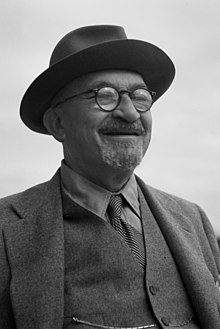Our website is made possible by displaying online advertisements to our visitors.
Please consider supporting us by disabling your ad blocker.
Chaim Weizmann
Chaim Weizmann | |
|---|---|
חיים ויצמן | |
 Weizmann in 1949 | |
| 1st President of Israel | |
| In office 17 February 1949 – 9 November 1952 | |
| Prime Minister | David Ben-Gurion |
| Preceded by | Himself (as Chairman of the Provisional State Council) |
| Succeeded by | Yitzhak Ben-Zvi |
| 2nd Chairman of the Provisional State Council of Israel | |
| In office 16 May 1948 – 17 February 1949 | |
| Prime Minister | David Ben-Gurion |
| Preceded by | David Ben-Gurion |
| Succeeded by | Himself (as President) |
| Personal details | |
| Born | Chaim Azriel Weizmann 27 November 1874 Motal, Grodno Governorate, Russian Empire |
| Died | 9 November 1952 (aged 77) Rehovot, Israel |
| Citizenship | Russian Empire United Kingdom Israel |
| Political party | General Zionists |
| Spouse | Vera Weizmann |
| Relations | Maria Weizmann (sister) Anna Weizmann (sister) Minna Weizmann (sister) Ezer Weizman (nephew) |
| Children | 2 |
| Alma mater | Technische Universität Darmstadt Technische Universität Berlin University of Fribourg |
| Profession | Biochemist |
| Known for | Politics: helped establish the State of Israel. Science: industrial fermentation, acetone–butanol–ethanol fermentation process, critical to the WWI Allied war effort. Founder of the Sieff Research Institute (now Weizmann Institute), helped establish the Hebrew University of Jerusalem. |
| Signature | |
Chaim Azriel Weizmann (/ˈkaɪm ˈwaɪtsmən/ KYME WYTE-smən;[a] 27 November 1874 – 9 November 1952) was a Russian-born Israeli statesman, biochemist, and Zionist leader who served as president of the Zionist Organization and later as the first president of Israel. He was elected on 16 February 1949, and served until his death in 1952. Weizmann was instrumental in obtaining the Balfour Declaration of 1917 and convincing the United States government to recognize the newly formed State of Israel in 1948.
As a biochemist, Weizmann is considered to be the 'father' of industrial fermentation. He developed the acetone–butanol–ethanol fermentation process, which produces acetone, n-butanol and ethanol through bacterial fermentation. His acetone production method was of great importance in the manufacture of cordite explosive propellants for the British war industry during World War I. He founded the Sieff Research Institute in Rehovot (later renamed the Weizmann Institute of Science in his honor), and was instrumental in the establishment of the Hebrew University of Jerusalem.
Cite error: There are <ref group=lower-alpha> tags or {{efn}} templates on this page, but the references will not show without a {{reflist|group=lower-alpha}} template or {{notelist}} template (see the help page).
Previous Page Next Page


